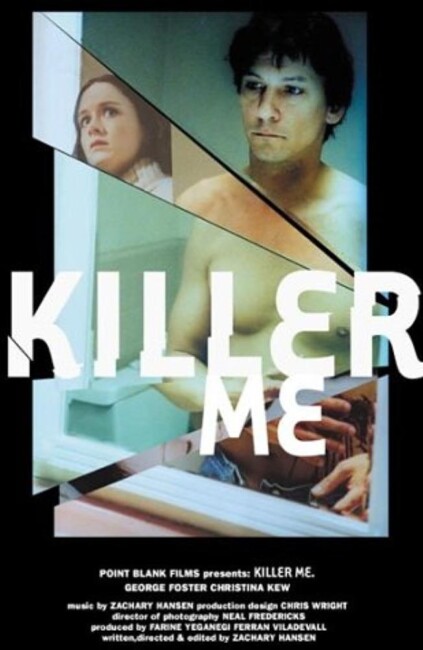USA. 2001.
Crew
Director/Screenplay/Music – Zachary Hansen, Producers – Ferran Viladevall & Farine Yeganegi, Photography – Neal Fredericks, Production Design – Chris Wright. Production Company – Point Blank Films.
Cast
George Foster (Joseph), Christina Kew (Anna)
Plot
George, a loner who works in the university library, is befriended by Anna, a shy new student in his criminology class. The two are attracted to each other. At the same time, George keeps waking up to find blood over himself and a deep cut on his ribcage. He finds himself stalking people and begins to wonder if he is not a serial killer.
Killer Me is a low-budget film from young debuting director Zachary Hansen. The film made its debut at the 2001 Telluride Film Festival and played a handful of other festivals.
While most low-budget debut features are merely enthusiastic fan films, Killer Me strikes with its conceptual ambitiousness. This is a low-budget psycho film with ambitions to be an arthouse film, rather than it ever seems like a genre psycho film. Conceptually, it comes somewhere between a Repulsion (1965), with its internal subjective depiction of madness, and the banal ordinary portrait of a killer as in The Minus Man (1999). It really is a kitchen sink psycho film – we do literally see a montage sequence of the psycho hero cleaning his apartment and scrubbing the bath.
The film is shot plain and unadorned – cameraman Neal Fredericks also filmed The Blair Witch Project (1999). However, Zachary Hansen’s tight, constrictive editing and especially his highly inventive aural soundscape, which was recorded on a children’s video-camera, gives the ordinariness an intense sense of claustrophobia. Rather than any generic slash-and-stalk psycho film, the entire film has the feeling of being like one single internal monologue that is taking place inside a disturbed mind.
There is a strong sense of ambiguity about the film. At the same time as he takes us inside the mind of a disturbed individual, Zachary Hansen keeps the central character deliberately opaque from us. It is entirely possible that George Foster’s protagonist may not even be a killer and may just be imagining it. The idea seems like a feature-length expansion of the twist that came at the end of American Psycho (2000), which gave the impression that the film we had just seen might all have been a delusion of inadequacy on the part of Christian Bale. There are couple of adroitly directed sequences where George Foster stalks an abusive father through a men’s room and then a darkened cinema, where in both cases fate intervenes to prevent him from going through with it. The two killings Foster believes he has conducted are never seen – indeed, we see no actual killings at all.
Zachary Hansen gets exceptional finely nuanced performances from his two leads. George Foster is fine in the role of Joseph. He gives a performance of shifting mercurial depths, ranging from a sullen withdrawn brooding to sly warmth. In that the essence of the character is essentially withheld from us, the complexity of Foster’s performance is considerable. Christina Kew is equally good as the female lead, giving a performance of shy vulnerability and unexpectedly quiet strengths. She is like a shyer, less pixieish Emily Watson.
Despite the promise he shows with Killer Me , Zachary Hansen has yet to direct another film.


